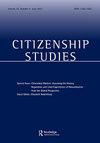大流行时期无证移民的公民身份:韩国案例
IF 1.9
3区 社会学
Q3 POLITICAL SCIENCE
引用次数: 0
摘要
2019冠状病毒病大流行对国民和非国民的公民身份都产生了影响。我们将公民身份定义为一个国家领土内所有人口的有争议的成员资格,包括人民的地位、权利和表现。我们关注非国民公民身份的变化,尤其是最脆弱的群体:无证移民。尽管非法移民一直受到歧视,但新冠疫情迫使韩国政府重新考虑有关非法移民的公民权政策。政府为长期在韩国被忽视的非法移民提供免费检测和治疗,并免费接种疫苗。它还暂停了对移民的打击和驱逐。虽然这些COVID-19预防措施旨在解决社区安全问题,但它们也影响了公民身份的多面性,使领土内的每个人都成为隔离的主体和客体。这些措施是否表明韩国公民身份的扩大,包括无证移民?我们将讨论韩国政府的疫情应对政策可能对公民身份产生的影响。在2019冠状病毒病大流行的背景下,随着公民身份边界的弹性越来越大,我们认为,在韩国公民身份的政治中,领土方面得到了更大的重视。本文章由计算机程序翻译,如有差异,请以英文原文为准。
Undocumented migrants’ citizenship in pandemic times: the South Korean case
ABSTRACT The COVID-19 pandemic has affected the citizenship of both nationals and non-nationals. We define citizenship as a contested membership among all populations within the territory of a state, encompassing the status, rights, and performativity of the people. We look at changes in the citizenship of non-nationals, particularly the most vulnerable: undocumented migrants. Despite long-standing discrimination against undocumented migrants, the COVID-19 pandemic compelled the South Korean government to reconsider its policies on their citizenship rights. The government provided free tests and treatments, and free vaccinations to the undocumented migrants who had long been ignored in South Korea. It also suspended immigration crackdowns and deportations. While these COVID-19 preventive measures were intended to address community safety, they also affected the multifaceted nature of citizenship by making everybody within the territory both the subject and object of quarantine. Do these measures indicate an expansion of South Korean citizenship to include undocumented migrants? We discuss what implications the South Korean government’s pandemic-response policies may have for citizenship. With the increasing elasticity of citizenship boundaries in the context of the COVID-19 pandemic, we claim that territorial aspects have been given greater emphasis in the politics of South Korean citizenship.
求助全文
通过发布文献求助,成功后即可免费获取论文全文。
去求助
来源期刊

Citizenship Studies
POLITICAL SCIENCE-
CiteScore
3.60
自引率
11.10%
发文量
85
期刊介绍:
Citizenship Studies publishes internationally recognised scholarly work on contemporary issues in citizenship, human rights and democratic processes from an interdisciplinary perspective covering the fields of politics, sociology, history and cultural studies. It seeks to lead an international debate on the academic analysis of citizenship, and also aims to cross the division between internal and academic and external public debate. The journal focuses on debates that move beyond conventional notions of citizenship, and treats citizenship as a strategic concept that is central in the analysis of identity, participation, empowerment, human rights and the public interest.
 求助内容:
求助内容: 应助结果提醒方式:
应助结果提醒方式:


